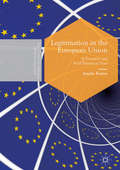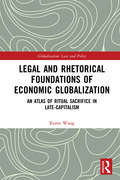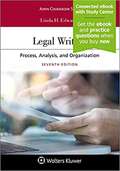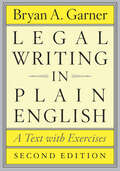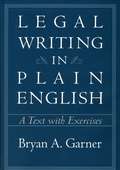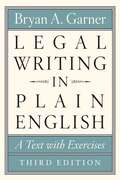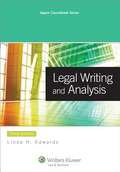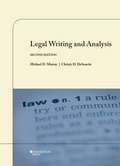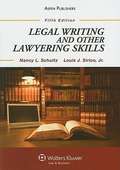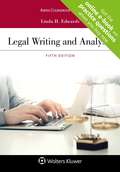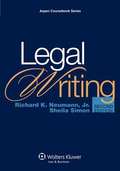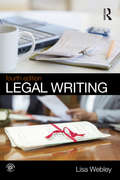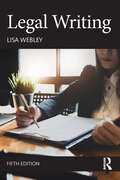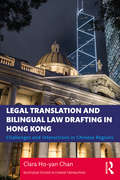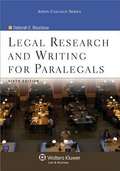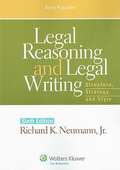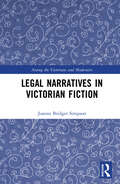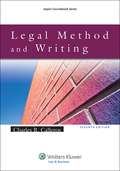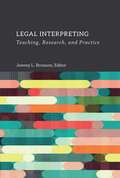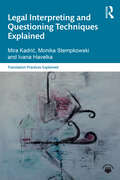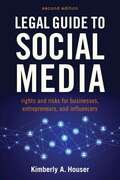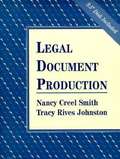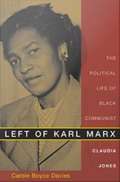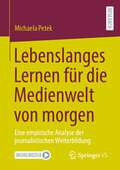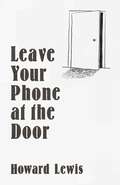- Table View
- List View
Legitimation in the European Union: A Discourse- and Field-Theoretical View (Postdisciplinary Studies in Discourse)
by Amelie KutterThis book offers a transdisciplinary perspective on the question of how political legitimacy is constructed in the increasingly contested postnational setting of the European Union. Drawing on the example of the controversy about the EU constitution and the use of ‘EU constitution speak’ in commentaries published by Polish and French broadsheets, it reveals the transformation that constructions of political authority and association undergo when they are being transposed from the discourse field of multilateral negotiation to that of national news media. Through an original combination of the linguistic theory of discourse developed in Critical Discourse Analysis, Bourdieu’s field theory and notion of symbolic power, and political thought on polity-building, it develops a framework for the discourse study of legitimation and Europeanisation, and proposes applications beyond the case studies in the book.To students of European integration, it demonstrates the potential these concepts have for unravelling the implicit practices of postnational polity building. Discourse researchers, on the other hand, will discover how detailed text analyses gain significance in debates related to the macro level of political organisation when guided by sociological and political theory.
Legal and Rhetorical Foundations of Economic Globalization: An Atlas of Ritual Sacrifice in Late-Capitalism (Globalization: Law and Policy)
by Keren WangThis book examines the subtle ways in which rhetorics of sacrifice have been re-appropriated into the workings of the global political economy in the 21st century. It presents an in-depth analysis of the ways in which ritual practices are deployed, under a diverse set of political and legal contexts, as legitimation devices in rendering exploitative structures of the prevailing political-economic system to appear inescapable, or even palatable. To this end, this work explores the deeper rhetorical and legal basis of late-capitalist governmentality by critically interrogating its mythical and ritual dimensions. The analysis gives due consideration to the contemporary incarnations of ritual sacrifice in the transnational neoliberal discourse: from those exploitative yet inescapable contractual obligations, to calendrical multi-billion dollar 'offerings' to the insatiable needs of 'too-big-to-fail' corporations.The first part of the book provides a working interpretative framework for understanding the politics of ritual sacrifice – one that not only accommodates multidisciplinary, interdisciplinary knowledge of ritual practices, but that can also be employed in the integrated analysis of sacrificial rituals as political rhetoric under divergent historical and societal contexts. The second conducts a series of case studies that cut across the wide variability of ritual public takings in late-capitalism. The book concludes by highlighting several key common doctrines of public ritual sacrifice which have been broadly observed in its case studies. These common doctrines tend to reflect the rhetorical and legal foundations for public takings under hegemonic market-driven governance. They define 'appropriate and proper' occasions for suspending pre-existing legal protections to regularize otherwise transgressive transfers of rights and possessions for the 'greater good' of the economic order.
Legal Writing: Process, Analysis, And Organization (Aspen Coursebook)
by Linda H. EdwardsBuy a new version of this textbook and receive access to the Connected eBook with Study Center on CasebookConnect, including: lifetime access to the online ebook with highlight, annotation, and search capabilities; practice questions from your favorite study aids; an outline tool and other helpful resources. Connected eBooks provide what you need most to be successful in your law school classes. Learn more about Connected eBooks Legal Writing: Process, Analysis, and Organization, Seventh Edition by the 2017 Burton Award recipient and renowned author, Linda Edwards, is the only legal writing text that uses a process approach, presenting writing as a logical sequence of steps. Streamlined to meet the needs of today’s students, the Seventh Edition uses adult learning theory concepts and a “flipped classroom” approach to add even greater focus and efficiency to classroom and study time. Key Features: New Chapter (4) on working with statutes. Updated chapter on citation Improved coverage of brief-writing Streamlined chapter on letter writing to better meet the need of a first-year course. Modern process approach, with streamlined content for better absorption by students Clear and informal language Helpful appendices offering sample of office memos, sample letters, and appellate briefs.
Legal Writing in Plain English: A Text with Exercises (Chicago Guides to Writing, Editing, and Publishing)
by Bryan A. Garner“This easy-to-follow guide is useful both as a general course of instruction and as a targeted aid in solving particular legal writing problems.” —Harvard Law ReviewClear, concise, down-to-earth, and powerful—all too often, legal writing embodies none of these qualities. Its reputation for obscurity and needless legalese is widespread. For more than twenty years, Bryan A. Garner’s Legal Writing in Plain English has helped address this problem by providing lawyers, judges, paralegals, law students, and legal scholars with sound advice and practical tools for improving their written work. The leading guide to clear writing in the field, this indispensable volume encourages legal writers to challenge conventions and offers valuable insights into the writing process that will appeal to other professionals: how to organize ideas, create and refine prose, and improve editing skills.Accessible and witty, Legal Writing in Plain English draws on real-life writing samples that Garner has gathered through decades of teaching. Trenchant advice covers all types of legal materials, from analytical and persuasive writing to legal drafting, and the book’s principles are reinforced by sets of basic, intermediate, and advanced exercises in each section.In this new edition, Garner preserves the successful structure of the original while adjusting the content to make it even more classroom-friendly. He includes case examples from the past decade and addresses the widespread use of legal documents in electronic formats. His book remains the standard guide for producing the jargon-free language that clients demand and courts reward.“Those who are willing to approach the book systematically and to complete the exercises will see dramatic improvements in their writing.” —Law Library Journal
Legal Writing in Plain English: A Text with Exercises
by Bryan A. GarnerAdmirably clear, concise, down-to-earth, and powerful-- unfortunately, these adjectives rarely describe legal writing, whether in the form of briefs, opinions, contracts, or statutes. In Legal Writing in Plain English, Bryan A. Garner provides lawyers, judges, paralegals, law students, and legal scholars sound advice and practical tools for improving their written work. The book encourages legal writers to challenge conventions and offers valuable insights into the writing process: how to organize ideas, create and refine prose, and improve editing skills. In essence, it teaches straight thinking-- a skill inseparable from good writing. Replete with common sense and wit, the book draws on real-life writing samples that Garner has gathered through more than a decade of teaching in the field. Trenchant advice covers all types of legal materials, from analytical and persuasive writing to legal drafting. Meanwhile, Garner explores important aspects of document design. Basic, intermediate, and advanced exercises in each section reinforce the book's principles. (An answer key to basic exercises is included in the book; answers to intermediate and advanced exercises are provided in a separate Instructor's Manual, free of charge to instructors.) Appendixes include a comprehensive punctuation guide with advice and examples, and four model documents. Today more than ever before, legal professionals cannot afford to ignore the trend toward clear language shorn of jargon. Clients demand it, and courts reward it. Despite the age-old tradition of poor writing in law, Legal Writing in Plain English shows how legal writers can unshackle themselves. Legal Writing in Plain English includes: *Tips on generating thoughts, organizing them, and creating outlines. *Sound advice on expressing your ideas clearly and powerfully. *Dozens of real-life writing examples to illustrate writing problems and solutions. *Exercises to reinforce principles of good writing (also available on the Internet). *Helpful guidance on page layout. *A punctuation guide that shows the correct uses of every punctuation mark. *Model legal documents that demonstrate the power of plain English.
Legal Writing in Plain English, Third Edition: A Text with Exercises (Chicago Guides to Writing, Editing, and Publishing)
by Bryan A. GarnerThe leading guide to clear writing—and clear thinking—in the legal profession for more than two decades, now newly updated. Admirably clear, concise, down-to-earth, and powerful—all too often, legal writing embodies none of these qualities. Its reputation for obscurity and needless legalese is widespread. Since 2001, Bryan A. Garner’s Legal Writing in Plain English has helped address this problem by providing lawyers, judges, paralegals, law students, and legal scholars with sound advice and practical tools for improving their written work. Now the leading guide to clear writing in the field, this indispensable volume encourages legal writers to challenge conventions and offers valuable insights into the writing process: how to organize ideas, create and refine prose, and improve editing skills. Accessible and witty, Legal Writing in Plain English draws on real-life writing samples that Garner has gathered through decades of teaching experience. Trenchant advice covers all types of legal materials, from analytical and persuasive writing to legal drafting, and the book’s principles are reinforced by sets of basic, intermediate, and advanced exercises in each section. For this third edition, Garner has retained the structure of the previous versions, with updates and new material throughout. There are new sections on making your writing vivid and concrete and on using graphics to enhance your argument. The coverage and examples of key topics such as achieving parallelism, avoiding legalese, writing effective openers and summaries, and weaving quotations into your text have also been expanded. And the sample legal documents and exercises have been updated, while newly added checklists provide quick summaries of each section. Altogether, this new edition will be the most useful yet for legal professionals and students seeking to improve their prose.
Legal Writing and Analysis (Third Edition)
by Linda H. EdwardsIdeal for beginning legal writers, this logically organized and exceptionally well-written text offers a concise and straightforward guide to legal writing and analysis. Updated to include exercises with increased focus on first-year courses, Legal Writing and Analysis, Second Edition, starts with an overview of the legal system and the lawyer¿s role, then leads students from reading and analyzing the law through the process of legal writing, providing numerous examples and exercises along the way. Classroom-tested features of this bestselling text include: a consistent use of the legal method approach, from an opening chapter providing an overview of a civil case and the lawyer¿s role, to information about the legal system, case briefing, synthesizing cases, and statutory interpretation an emphasis on analogical reasoning and synthesizing cases, as well as rule-based and policy-based reasoning, with explanations of how to use these types of reasoning to organize a legal discussion a logical organization that starts with reading and analyzing the law and then moves on to writing the discussion of a legal question, writing an office memo and professional letters, and advocacy writing. chapters addressing style and formality considerations as well as oral advocacy effective coverage of the use of precedent a superior discussion of small-scale organization, including the thesis paragraph numerous examples and frequent short exercises that encourage students to apply concepts a comprehensive Teacher¿s Manual that offers helpful advice for instructors. The Second Edition offers new exercises, including increased focus on first-year courses. a revision of Part Five on advocacy writing, streamlining the order of the chapters and adding more coverage of questions presented an updated citation chapter. Chapter 12 on the Office Memorandum has been expanded to add another format for a question presented and is accompanied by an example
Legal Writing and Analysis (Coursebook Ser.)
by Michael Murray Christy DeSanctisThis law school text teaches the fundamentals of legal writing, analysis, and the American legal method. It fosters critical lawyering skills, such as how to identify a legal rule from a variety of sources, analyze and explain its components, apply the rule to answer a problem, and communicate the results in an effective manner. In the second edition, coverage of authority and rule formation have been streamlined and tightened. The authors have increased the visual appeal and content of callout boxes, charts, and tables; and they have replaced and shortened the length of examples so as to provide two to three times as many samples of practitioner writing in each chapter. With this new edition, the authors endeavor to train future lawyers to be ethical and professional issue-spotters, analysts, counselors, problem-solvers, and communicators working to advance their clients’ interests.
Legal Writing And Other Lawyering Skills, 5e
by Nancy L. Schultz Louis J. Sirico Jr.With a consistent emphasis on precision and good organization, Legal Writing and Other Lawyering Skills, Fifth Edition, shows students how tod raft memoranda, opinion letters, pleadings, briefs, and other legal documents. But because communication in the practice of law occurs in specificcontexts, authors Nancy L. Schultz and Louis J. Sirico, Jr . teach other valuable lawyering skills, such as client counseling, negotiating,and how to present an oral argument before the court, in this timely andstudent-friendly text. Now with a more contemporary look that reflects a new publisher and revisions requested by users of the text, the Fifth Edition of Legal Writing and Other Lawyering Skills features: a straightforward and student-friendly approach, framed and supported by a logical organization, streamlined coverage that focuses on basic communication skills in practice, complete coverage of legal writing--with outstanding chapters on writing style and how to write a memo, in-depth instruction on legal analysis, oral argument, and how to write an appellate brief, a helpful preliminary overview of the American legal system, refreshed, updated, and carefully honed practice exercises, expanded coverage of electronic research, new coverage of electronic communication, format, etiquette, ethics, and liability, thoroughly up-to-date court citations, cases, and sample documents, generous use of sample documents within the text and in the Appendices. The focused exercises and examples in Legal Writing and Other Lawyering Skills, Fifth Edition, simulate the tasks performed by lawyers in practice and reflect the authors' forward-looking, practice-based approach to teaching writing and lawyering skills to law students.
Legal Writing And Analysis (Aspen Coursebook)
by Linda Holdeman EdwardsThis streamlined text offers a straightforward guide to developing legal writing and analysis skills for beginning legal writers. Legal Writing and Analysis, Fifth Edition by Linda Edwards, leads students logically through reading and analyzing the law, writing the discussion of a legal question, and writing office memos, letters, and briefs. The text includes chapters on citation form, writing style, professionalism, and oral argument. <P><P> The book features special focus on forms of legal reasoning (rules, analogies, policies, principles, customs, inferences, and narrative) complete with examples and exercises. It teaches students to recognize rule structures and use them to organize their document. <P><P> New to the Fifth Edition: Streamlined chapters and exercises Updated citation materials covering current editions of both citation manuals Product page featuring more material on professional letters and accessible coverage and use of legal theory <P><P>Professors and students will benefit from: Contextual learning, including important legal method material Superior treatment of how to organize a legal discussion Clear, ample coverage of legal reasoning Practice-oriented approach Numerous examples and short exercises for formative assessment Strong coverage of professional responsibility
Legal Writing (2nd Edition)
by Sheila J. Simon Richard K. Neumann Jr.Written for law students, this well-organized and thorough book shows how to hone legal writing skills in real-world situations. Topics include process, style, memoranda writing, organizing analysis (CREAC), analytical writing, persuasive writing, telling a client's story, making the client's argument, appellate briefs, and oral argument. Each chapter includes exercises. Appendices contain sample memos and briefs. An accompanying access code protected website offers supplementary material including videos, checklists, and articles. Annotation ©2011 Book News, Inc. , Portland, OR (booknews. com)
Legal Writing
by Lisa WebleyLegal Writing guides students comprehensively through this vital legal skill and addresses a range of assessment methods from exam questions to final essays and problem answers. It considers how to deconstruct essay and problem questions and how to conduct and apply legal research to answer set questions. Lisa Webley explains how to reference others' work clearly and correctly, making this book a useful tool for students concerned about issues of plagiarism. It also focuses on how to develop critical thinking and communicate legal arguments, with both good and bad examples of written work considered and discussed in the text. Legal Writing is particularly useful for undergraduate students, especially at the beginning of degree studies, and for GDL and CPE students too. This fully revised fourth edition includes: Guidance on the avoidance of plagiarism including examples of poor practice and best practice. Worked examples throughout the text, including guidance on deciphering essay questions in exams and coursework, along with additional examples from across the legal curriculum on the companion website. An improved companion website with increased guidance for revision to allow students to test their progress and further engage with the topics in the book. Clearly written and easy to use, Legal Writing enables students to fully engage with essay and exam writing as a vital foundation to their undergraduate degree.
Legal Writing
by Lisa WebleyLegal Writing guides students comprehensively through this vital legal skill and addresses a range of assessment methods from exam questions to final essays and problem answers. It considers how to deconstruct essay and problem questions and how to conduct and apply legal research to answer set questions. Lisa Webley explains how to reference others’ work clearly and correctly, making this book a useful tool for students concerned about issues of plagiarism. Legal Writing also focuses on how to develop critical thinking and communicate legal arguments, with both good and bad examples of written work considered and discussed in the text. Legal Writing is particularly useful for undergraduate students, especially at the beginning of degree studies, as well as for those preparing for the SQE exams. This fully revised fifth edition includes: Guidance on how to avoid plagiarism, including examples of the best and worst practices Worked examples throughout the text, including how to decipher essay questions in exams and coursework An expanded set of accompanying digital learning resources with increased guidance for revision to allow students to test their progress and further engage with the topics in the book. Clearly written and easy to use, Legal Writing enables students to fully engage with essay and exam writing as a vital foundation to their undergraduate degree.
Legal Translation and Bilingual Law Drafting in Hong Kong: Challenges and Interactions in Chinese Regions (Routledge Studies in Chinese Translation)
by Clara Ho-yan ChanLegal Translation and Bilingual Law Drafting in Hong Kong presents a systematic account from a cross-disciplinary perspective of the activities of legal translation and bilingual law drafting in the bilingual international city of Hong Kong and its interaction with Mainland China and Taiwan in the use of legal terminology. The study mainly examines the challenges posed to English-Chinese translation in the past three decades by elaborate drafting and terminological equivalence, and offers educational and research solutions. Its primary goals are to create legal Chinese that naturally accommodates common law concepts and statutes from the English legal system and to reconcile Chinese legal terms from the different legal systems adopted by Hong Kong, Mainland China and Taiwan. The new directions in legal translation and bilingual law drafting in Hong Kong will have implications for other Chinese regions and for the world. The book is intended for scholars, researchers, teachers and students of legal translation and legal linguistics, legal translators, lawyers and legal practitioners who are engaged in translation, as well as all persons who are interested in legal language and legal translation.
Legal Research and Writing For Paralegals (Sixth Edition)
by Deborah E. BouchouxFocusing on the issues that paralegals face on the job, Legal Research and Writing for Paralegals presents an organized and practical introduction to legal research and writing. The carefully updated Sixth Edition takes a close look at new products and developments in electronic research while continuing to build on the strength of its pedagogy. A comprehensive overview enriched by illustrations and exercises, this text features: * an approach that integrates writing strategies into research chapters to show the link between these two processes * thorough coverage of electronic research, with a chapter on Internet research and fee-based services, such as Lexis and Westlaw * pointers throughout for using electronic resources more effectively * helpful charts and diagrams that clearly illustrate complex topics * Practice Tips in each chapter that offer realistic and helpful suggestions for workplace success * State Your Answer exercises that help students learn how to navigate through cyberspace * Internet Assignmentswhich can be made state-specific;that give students practice finding information on-line * step-by-step guidance for proper citation formkeyed to the fourth edition of ALWD and the new 19th edition of The Bluebook * directions for how to update and validate legal authorities * samples of legal writing, such as letters, a court brief, and a legal memorandum Updated throughout, the new Sixth Edition gives you more: * expanded coverage of electronic research * how to use "Google Scholar" to locate cases * how to access government documents from GPO Access to FDsys * the new features from Westlaw and Lexis, including WestlawNext, the new "intuitive platform" the new Easy Search feature, and Case in Brief * Fastcase, the fee-based, computer-assisted system, its free "app" for iPhones, and other law-related apps * a new assignment that uses Loislaw * a new assignment that compares Shepardize and KeyCite * new sample pages
Legal Reasoning and Legal Writing: Structure, Strategy, and Style (6th edition)
by Richard K. NeumannThe Sixth Edition of this respected and popular text remains grounded in the premise that legal reasoning and legal writing are best learned when they are taught together. Building on that foundation, Neumann continues to offer complete, clear, and timely coverage of how to form a legal argument and how to write an effective legal memorandum. Streamlined in its Sixth Edition, Legal Reasoning and Legal Writing features: comprehensive coverage of legal writing: the office memo; the motion memo; the appellate brief; eminently readable text, including an exceptionally lucid explanation of the reasoning behind the proof of a conclusion of law; a thoughtful treatment of all aspects of legal reasoning; student-friendly instruction on the process of writing, the mechanics of style, and grammar up-to-date examples and exercises; sample documents in the Appendices, including an office memo, motion memo, and two appellate briefs. Highly regarded author Richard K. Neumann, Jr. presents, in tandem, smart, in-depth coverage of legal writing and legal reasoning, supported by examples, writing samples, and extraordinarily clear and lucid exposition.
Legal Narratives in Victorian Fiction (Among the Victorians and Modernists)
by Joanne Bridget SimpsonThe law holds up a mirror to society and reflects that society and its ongoing preoccupations. This book establishes legal interpretation as a mode of literary interpretation, contextualising the opinions and sociological background of literature within the context of the law of its period and examines the inherent role of the law in the construction of the narrative in the literature of the nineteenth century. From the approach to the operation of jurisprudence and legal application, to the prosecution of the poor, the criminological approach to moral panics and the use of the affirmative defence to mitigate women within society, this book explores the ways in which the authors of the period used the novel form as a way of challenging and critiquing the legal operating model of the world in which their characters found themselves; examining the way in which the authors of the period used the novel as a means of critiquing the nature of the role of the law within society, its impact upon the general public, and the reciprocity which exists between legal ideals and the society which manifests those ideals through thought and action. This is a useful text for students of nineteenth-century literature or the law.
Legal Method And Writing
by Charles CallerosHighly regarded and classroom-proven, the Legal Method and Writing takes a comprehensive approach to legal writing that bridges law school and law office. Exercises and real-life examples--many taken from actual cases--provide stepping-off points from which to practice legal thinking and communication. Calleros seamlessly weaves multicultural themes into many of the problems and examples to add context and enrich student understanding of legal issues.
Legal Interpreting: Teaching, Research, and Practice (The Interpreter Education Series #12)
by Jeremy L. BrunsonLinguistic minorities are often severely disadvantaged in legal events, with consequences that could impact one’s very liberty. Training for interpreters to provide full access in legal settings is paramount. In this volume, Jeremy L. Brunson has gathered deaf and hearing scholars and practitioners from both signed and spoken language interpreting communities in the United States, Canada, and the United Kingdom. Their contributions include research-driven, experience-driven, and theoretical discussions on how to teach and assess legal interpreting. The topics covered include teaming in a courtroom, introducing students to legal interpreting, being an expert witness, discourses used by deaf lawyers, designing assessment tools for legal settings, and working with deaf jurors. In addition, this volume interrogates the various ways power, privilege, and oppression appear in legal interpreting. Each chapter features discussion questions and prompts that interpreter educators can use in the classroom. While intended as a foundational text for use in courses, this body of work also provides insight into the current state of the legal interpreting field and will be a valuable resource for scholars, practitioners, and consumers.
Legal Interpreting and Questioning Techniques Explained (Translation Practices Explained)
by Mira Kadrić Monika Stempkowski Ivana HavelkaLanguage and law are closely linked, and language is fundamental to the application of the law. Legal, criminalistic, translational and psychological aspects of communication come together in interpreted questioning (hearings, interrogations, interviews) and must be taken into account, especially since the way in which the questioning outcomes are evaluated can have far-reaching legal consequences. Building on empirical studies and practice, this accessible text provides a transdisciplinary examination of questioning methods and strategies. The institutional framework conditions of a questioning situation are examined in the context of transdisciplinary cooperation.This book also addresses the increasing use of technology and hybrid forms of translation and interpreting in the legal system, and shows different ways in which interpreters co-construct information. Chapters include summaries of key concepts and definitions, examples from existing literature combined with practical experience and the results of surveys conducted by the authors, as well as further reading and non-language-specific study activities. Activities include role plays on thematic scenarios involving different actors in criminal proceedings and discussion groups to enable reflection on ethical issues and discursive challenges.This is a vital text for both advanced students and professionals in interpreting studies and criminology.
Legal Guide to Social Media, Second Edition: Rights and Risks for Businesses, Entrepreneurs, and Influencers
by Kimberly A. HouserLearn how to navigate the ins and outs of the law and social media. How should you respond to a request to remove copyrighted materials from a Facebook page? If you create a Twitter username at work, who owns the username when you change jobs? Can you be sued for libel if someone thinks your posts are defamatory? If you&’ve ever asked yourself these kinds of questions, this pioneering legal handbook is for you. Despite the enormous growth in social media usage by businesses and influencers, very little has been written about the laws affecting their activities. In this new edition of the Legal Guide to Social Media, Kimberly A. Houser, law professor and tech attorney, explains the potential pitfalls and how to avoid them including what social media influencers could have done to protect themselves from the lawsuits resulting from the Fyre Festival debacle. Easy-to-understand, comprehensive, and up-to-date, the Legal Guide to Social Media, Second Edition provides the latest information on case law and statutes. It covers everything from privacy laws to the legal considerations in setting up a page or website as well as new governmental regulations. This plain English legal companion offers examples of and solutions to the kinds of situations you can expect to encounter when posting online content, whether for yourself, your own business, or on behalf of your client&’s business. You&’ll learn how to avoid liability for defamation and third-party posts, how to protect your own content, the unique legal issues surrounding social media in the workplace, and much, much more. The new edition covers new state regulations on privacy, data security and advertising; how to avoid intellectual property infringement actions; and the newer legal risks for influencers.
Legal Document Production
by Nancy Creel Smith Tracy Rives JohnstonThis combination book/workbook/reference provides a well-rounded overview of the procedures to follow in producing legal documents in six areas of law, general legal correspondence, and miscellaneous documents. Readers gain hands-on experience formatting and producing documents using any software package, word processor, electronic typewriter, or standard typewriter. The book provides a realistic approach to the procedural process required in the court system; features a wide variety of hands-on projects that focus on the documents themselves-- i. e. , the projects are suitable for any word processing software used with a computer, electronic typewriter, word processor, or standard typewriter; includes projects that highlight the documents from a variety of states, including specific features of California, Florida, Illinois, New York, Ohio, Texas, Virginia.
Left of Karl Marx: The Political Life of Black Communist Claudia Jones
by Carole Boyce DaviesIn Left of Karl Marx, Carole Boyce Davies assesses the activism, writing, and legacy of Claudia Jones (1915-1964), a pioneering Afro-Caribbean radical intellectual, dedicated communist, and feminist. Jones is buried in London's Highgate Cemetery, to the left of Karl Marx--a location that Boyce Davies finds fitting given how Jones expanded Marxism-Leninism to incorporate gender and race in her political critique and activism. Claudia Cumberbatch Jones was born in Trinidad. In 1924, she moved to New York, where she lived for the next thirty years. She was active in the Communist Party from her early twenties onward. A talented writer and speaker, she traveled throughout the United States lecturing and organizing. In the early 1950s, she wrote a well-known column, "Half the World," for the Daily Worker. As the U. S. government intensified its efforts to prosecute communists, Jones was arrested several times. She served nearly a year in a U. S. prison before being deported and given asylum by Great Britain in 1955. There she founded The West Indian Gazette and Afro-Asian Caribbean News and the Caribbean Carnival, an annual London festival that continues today as the Notting Hill Carnival. Boyce Davies examines Jones's thought and journalism, her political and community organizing, and poetry that the activist wrote while she was imprisoned. Looking at the contents of the FBI file on Jones, Boyce Davies contrasts Jones's own narration of her life with the federal government's. Left of Karl Marx establishes Jones as a significant figure within Caribbean intellectual traditions, black U. S. feminism, and the history of communism.
Lebenslanges Lernen für die Medienwelt von morgen: Eine empirische Analyse der journalistischen Weiterbildung
by Michaela PetekWarum „lebenslanges Lernen für die Medienwelt von morgen“ sowohl für Journalistinnen und Journalisten als auch für Medienunternehmen alternativlos ist, legt Michaela Petek hier in einer empirischen Analyse der journalistischen Weiterbildung dar. Im Vergleich zum seit fünf Jahrzehnten gut untersuchten Bereich der journalistischen Ausbildung wird damit erstmals in der Journalismusforschung die Weiterbildung umfassend unter die Lupe genommen. Michaela Peteks Ziel ist es, alle Akteure auf dem journalistischen Weiterbildungsmarkt in die Untersuchung mit einzubeziehen: Journalist*innen, Medienunternehmen und Weiterbildungsinstitutionen. Neben ökonomischen Zwängen sind es vor allem die technischen Innovationen, die den Wandel in der Medienlandschaft vorantreiben. So entstehen ständig neue Produkte und Formate, Redaktionsstrukturen, Arbeitsabläufe, Berufsbilder. In dieser sich rasant wandelnden Medienwelt ist die kontinuierliche Investition in Weiterbildung für Journalistinnen und Journalisten notwendig, um einem immer wieder neu an die Veränderungen anzupassenden journalistischen Kompetenzprofil gerecht zu werden.
Leave Your Phone at the Door: The Joy of OFFLINE
by Howard LewisLeave Your Phone at the Door acts as a timely and topical reminder to look beyond our phones and enjoy the physical benefits of community, randomness and serendipity.Real life happens beyond your phone screen. Leave Your Phone at the Door embraces the OFFLINE philosophy, which is a celebration of the much underrated virtues of randomness and serendipity. Whether sharing stories of unexpected encounters, alarming behavioral trends or the joys of quiet and contemplation, Howard Lewis encourages us to adopt an open mind and a generosity of spirit whenever we are confronted by the unfamiliar or surprising or different. We all have an innate desire to communicate but our constant reliance today upon personal technology is stripping our sensibilities bare. But rather than focusing upon the limitations of social media and phones, Lewis is far more animated by the mindful reframing of our place in the world. He offers his insights on the importance of relating to people in person and advice on developing social skills and habits that enrich our lives. What began as an informal gathering with friends led to the launch of the OFFLINE dinner, which he has hosted for over fifteen years in London. Guests are drawn from all walks of life and invited to engage with one another without the distraction of their phones. OFFLINE is designed to be the antithesis of everything online but also recognizes that veering off road and then back on it is both valuable and necessary. It aims to challenge and provoke, question and answer, stimulate and amuse, nurture and nourish in a delightful and congenial setting. This book is an embodiment of that ethos. Leave Your Phone at the Door acts as a timely and topical reminder to look beyond our phones and enjoy the physical benefits of community, randomness and serendipity. Who knows where it may take you and whom you might meet?!
